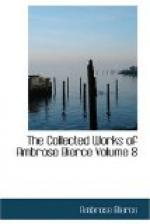The elves and fairies “dance delicate measures” in the light of the moon and stars. The troll dances his gruesome jig on lonely hills the gnome executes his little pigeon wing in the obscure subterrene by the glimmer of a diamond. Nature’s untaught children dance in wood and glade, stimulated of leg by the sunshine with which they are soaken top full—the same quickening emanation that inspires the growing tree and upheaves the hill. And, if I err not, there is sound Scripture for the belief that these self same eminences have capacity to skip for joy. The peasant dances—a trifle clumsily—at harvest feast when the grain is garnered. The stars in heaven dance visibly, the firefly dances in emulation of the stars. The sunshine dances on the waters. The humming bird and the bee dance about the flowers which dance to the breeze. The innocent lamb, type of the White Christ, dances on the green, and the matronly cow perpetrates an occasional stiff enormity when she fancies herself unobserved. All the sportive rollickings of all the animals, from the agile fawn to the unwieldly behemoth are dances taught them by nature.
I am not here making an argument for dancing, I only assert its goodness, confessing its abuse. We do not argue the wholesomeness of sunshine and cold water, we assert it, admitting that sunstroke is mischievous and that copious potations of freezing water will founder a superheated horse, and urge the hot blood to the head of an imprudent man similarly prepared, killing him, as is right. We do not build syllogisms to prove that grains and fruits of the earth are of God’s best bounty to man; we allow that bad whisky may—with difficulty—be distilled from rye to spoil the toper’s nose, and that hydrocyanic acid can be got out of the bloomy peach. It were folly to prove that Science and Invention are our very good friends, yet the sapper who has had the misfortune to be blown to rags by the mine he was preparing for his enemy will not deny that gunpowder has aptitudes of mischief; and from the point of view of a nigger ordered upon the safety-valve of a racing steamboat, the vapor of water is a thing accurst. Shall we condemn music because the lute makes “lascivious pleasing?” Or poetry because some amorous bard tells in warm rhyme the story of the passions, and Swinburne has had the goodness to make vice offensive with his hymns in its praise? Or sculpture because from the guiltless marble may be wrought a drunken Silenus or a lechering satyr?—painting because the untamed fancies of a painter sometimes break tether and run riot on his canvas? Because the orator may provoke the wild passions of the mob, shall there be no more public speaking?—no further acting because the actor may be pleased to saw the air, or the actress display her ultimate inch of leg? Shall we upset the pulpit because poor dear Mr. Tilton had a prettier wife than poor, dear Mr. Beecher? The bench had its Jeffrey, yet it is necessary that we have the deliveries of judgment




